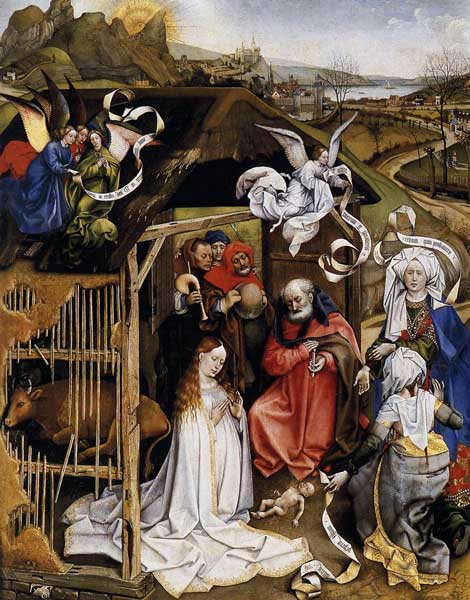(RNS) Mary Elizabeth Sperry knows it’s time to hang the Christmas lights when the phone calls and emails about Isaiah 7:14 start to arrive.
Sperry is the point person for questions about the New American Bible, Revised Edition, which the Catholic bishops released in March 2011 after decades of work by dozens of scholars.
Among other changes, the new translation tweaks an Old Testament text — Isaiah 7:14 — that many Christians consider a prophecy about Jesus’ birth. In Matthew’s Gospel, for example, an angel cites the passage to convince Joseph to accept Mary’s mysterious pregnancy.
But in the new Catholic Bible, the prophet’s prediction and the angel’s words don’t quite match anymore. The word “virgin” has been replaced with “young woman” in Isaiah 7:14.
Few Christian doctrines are as tightly held as the belief in Jesus’ chaste conception. It’s mentioned several times in the Gospels, cited in the earliest creeds and considered essential evidence of Jesus’ divinity by many Christians.
Quizzical Catholics have been peppering Sperry with questions, especially at Christmastime. Why alter a 2,745-year-old prophecy? Does it change what the church teaches about Jesus’ birth?
“I explain that it’s not a denial of the doctrine of the church or anything like that,” Sperry said. “It’s simply an accurate translation of the word used by the prophet.”
Isaiah was an ornery guy, and not always the easiest prophet to decipher, but here’s what we know. His book takes place around 730 B.C., when powerful neighbors threatened the Kingdom of Judah. The feckless King Ahaz wanted to sign a peace treaty with Assyria, which would entail worshipping their gods.
Isaiah was apoplectic, and wanted to convince Ahaz that Assyria would soon fall. A boy named Immanuel will be born, the prophet predicted, and before he knows right from wrong — that is, reaches maturity — Judah’s rivals will lay in ruins.
Even as erudite a scholar as Pope Benedict XVI admits that many Bible experts are perplexed by Isaiah’s prophecy. That is, they can’t quite figure out what it meant to the Hebrews. “There is nothing in its own historical context to correspond to it,” Benedict writes in his new book, “Jesus of Nazareth: The Infancy Narratives.”
But nearly 800 years after Isaiah — a very long pregnancy for a prophecy, one scholar joked — the puzzling prediction made perfect sense to at least one Christian. In Isaiah 7:14, the writer of Matthew’s Gospel saw a premonition of Jesus’ birth.
Eager to convince Jews that Jesus was God’s promised messiah, Matthew planted references to the Hebrew Scriptures throughout his Gospel like clues in a mystery novel.
In the most famous example, an angel appears to Joseph in a dream and tells him that Mary’s pregnancy fulfills what “was spoken by the Lord through the prophet”: a virgin shall conceive and bear a son. Jesus, the angel implies, is Isaiah’s long-awaited Immanuel.
The message may have lifted a weight from Joseph’s mind, but it also dropped a conundrum into the laps of modern Christians, including the translators of the New American Bible, Revised Edition.
In short, some scholars say, Matthew’s Gospel misreads Isaiah.
Matthew drew his Isaiah 7:14 reference from the Septuagint, a Greek translation of the Hebrew Bible begun several centuries before Christ’s birth. According to the Septuagint, Isaiah predicts that a “parthenos” — a virgin — will conceive a child.
But Jews later rejected the Septuagint as inaccurate, said Naomi Sheindel Seidman, a professor of Jewish culture at the Graduate Theological Union in Berkeley, Calif.
Many scholars now argue that Isaiah didn’t actually use the Hebrew word for virgin to describe Immanuel’s mother. Instead, he called her an “almah” — a “young woman.”
So instead of prophesying a miraculous birth, Isaiah might have been using a homey metaphor — a biological clock, if you will, to relay this message: Be patient, Judah. In the time it takes for a young boy to mature, Assyria will fall.
To be sure, Christians have long known about the Isaiah 7:14 issue.
In a second century apologetic, Christian theologian Justin Martyr argues with a fictional Jewish stand-in named Trypho, who points out the mistranslation.
“The Scripture has not, ‘Behold, the virgin shall conceive, and bear a son,’ but, ‘Behold, the young woman shall conceive, and bear a son,’” says Trypho, who also accuses Christians of borrowing the virgin birth trope from Greek mythology.
In the modern era, belief in the accuracy of Isaiah 7:14 became a proxy for faith in the Virgin birth, which itself remains a fault line between liberal and conservative Christians.
When the Revised Standard Version of the Bible dared to substitute “young woman” for “virgin” in 1952, Protestant fundamentalists burned copies on church lawns, according to Peter Thuesen’s book “In Discordance with the Scriptures: American Protestant Battles over Translating the Bible.”
“This has been the dream of the modernists for centuries” said one Baptist pastor, “to make Jesus Christ the son of a bad woman.”
To this day, most evangelical Bibles render almah as “virgin,” though often with a footnote that offers “young woman” as an alternative.
The Catholic bishops refused to alter Isaiah 7:14 when the first edition of the New American Bible was produced in 1970, though translators advocated for the change, according to Thuesen. Since then, a number of Catholic Bibles have made the virgin/young woman switch.
Still, there was some “pastoral concern,” when the Catholic bishops authorized the New American Bible, Revised Edition, said retired Auxiliary Bishop Richard Sklba of Milwaukee, who was part of the review and editing team.
“There was discussion about keeping the traditional translation so that people have the benefit of continuity,” Sklba said.
But in the big picture, changing Isaiah 7:14 doesn’t sever the connection between the prophecy and Matthew’s Gospel, he said. Isaiah stressed that Immanuel’s mother would be young, and Matthew emphasized her virginity.
“The one does not deny the other,” Sklba said.
KRE/AMB END BURKE





